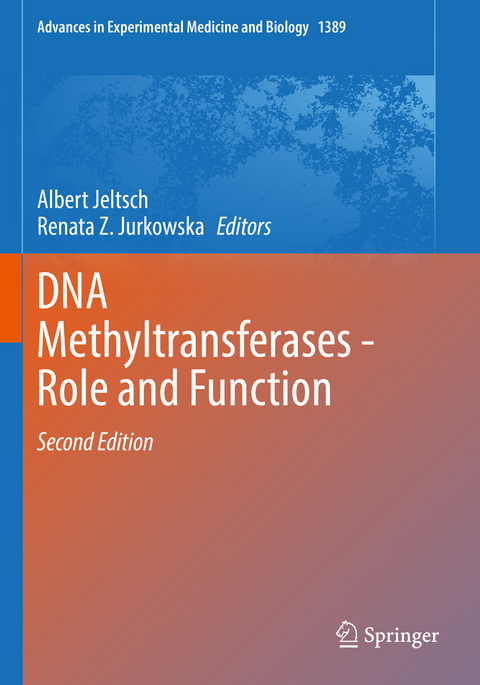
DNA Methyltransferases - Role and Function
Springer International Publishing (Verlag)
978-3-031-11456-4 (ISBN)
This 2nd edition of the book on DNA methyltransferases has been comprehensively updated to reflect many novel research findings regarding the structure, function, and technology of these enzymes that have emerged over the past 6 years.
Like the previous edition, this 2nd edition explains the biochemical properties of DNA methyltransferases, describing their structures, mechanisms and biological roles in bacteria, humans and plants. It also discusses the biological processes of reading DNA methylation and the mechanisms of DNA demethylation. This volume highlights the newest findings on DNA methyltransferase inhibitors and their use in cancer therapy as well as the latest epigenome editing systems based on these enzymes.
Overall, this 2nd edition comprehensively summarizes the current state of research in the field of DNA methylation and DNA methyltransferase and is essential reading for early career and advanced researchers in this exciting field.
lt;p>Prof. Albert Jeltsch is a biochemist who received his PhD in Biochemistry 1994 at the Medical University Hannover (Germany). After PostDoc and Assistant Professorship (2003) at Justus-Liebig University in Giessen, he was appointed as Associate Professor of Biochemistry at Jacobs University Bremen in 2003, where he became Full Professor of Biochemistry in 2006. Prof. Jeltsch moved to the University of Stuttgart in 2011, where he is heading the Department of Biochemistry at the Institute of Biochemistry and Technical Biochemistry. For more than 25 years, the group of Prof. Jeltsch is investigating the structure, mechanism and function of bacterial and mammalian DNA methyltransferases. They have long-standing expertise in the field of rational and evolutionary protein design of DNA interacting enzymes and in the design of chimeric methylation enzymes for epigenome editing and gene regulation in eukaryotic cells. In addition, they study the specificity and activity of protein lysine methyltransferases and methyllysine reading domains and the biological role of protein methylation in cells.
Dr Renata Jurkowska is a molecular biologist with general interests in epigenetics, stem cells and lung biology. She obtained her M.Sc. degree in Biotechnology at Warsaw University (Poland) and went on to complete her PhD in Biochemistry and two postdocs in Germany, where she investigated the specificity and molecular mechanism of mammalian DNA methyltransferases and other epigenetic enzymes for 10 years. In 2015, she joined BioMed X Innovation Center (Germany) as a Principal Investigator, where she worked at the interface between academia and industry, leading a biomedical preclinical project in the field of respiratory medicine and epigenetics. In September 2019 she was appointed Senior Lecturer in the School of Biosciences at Cardiff University, UK. Her current research focuses on understanding how epigenetic regulation drives cellular identity in the healthy lung and how dysregulation of epigenetic processes due to environmental insults contributes to the development of lung diseases. Her group uses epigenomics technologies in combination with molecular biology tools to advance the mechanistic understanding of lung diseases, identify epigenetic biomarkers for diagnosis, and devise novel epigenetic therapeutic strategies.
Chapter 1. Mechanisms and biological roles of DNA methyltransferases and DNA methylation - from past achievements to future challenges.- Chapter 2.Bacterial DNA Methylation and Methylomes.- Chapter 3. ChapterDomain Structure of the Dnmt1, Dnmt3a, and Dnmt3b DNA Methyltransferases.- Chapter 4. Enzymology of Mammalian DNA Methyltransferases.- Chapter 5. Genetic Studies on Mammalian DNA Methyltransferase.- Chapter 6. Structure and Mechanism of Plant DNA Methyltransferases.- Chapter 7. DNA Methylation in Honey Bees and the Unresolved Questions in Insect Methylomics.- Chapter 8. N6-Methyladenine: A Conserved and Dynamic DNA Mark.- Chapter 9. Pathways of DNA Demethylation.- Chapter 10. Structure and Function of TET Enzymes.- Chapter 11.Proteins That Read DNA Methylation.- Chapter 12. Recent advances on DNA base flipping - a general mechanism for writing, reading, and erasing DNA modifications.-Chapter 13. The Role of DNA Methylation in Cancer.- Chapter 14. DNMTs and DNA damage.- Chapter 15. Role of DNMTs in brain.- Chapter 16. Current and Emerging Technologies for the Analysis of the Genome-Wide and Locus-Specific DNA Methylation Patterns.-Chapter 17. Inhibitors of DNA methylation.- Chapter 18. Rewriting DNA Methylation Signatures at Will: The Curable Genome Within Reach? .- Chapter 19. DNA Labeling Using DNA Methyltransferases.
| Erscheinungsdatum | 11.11.2023 |
|---|---|
| Reihe/Serie | Advances in Experimental Medicine and Biology |
| Zusatzinfo | IX, 562 p. 1 illus. |
| Verlagsort | Cham |
| Sprache | englisch |
| Maße | 178 x 254 mm |
| Gewicht | 994 g |
| Themenwelt | Naturwissenschaften ► Biologie ► Mikrobiologie / Immunologie |
| Naturwissenschaften ► Biologie ► Zellbiologie | |
| Schlagworte | Biomarkers • Cancer • Cellular memory • Chromatin • Control of gene expression • Demethylation • DNA base flipping • DNA labelling • DNA Methylation • DNA methylation signature • DNMT1 • DNMT3A • DNMT3B • Emerging Technologies • Epigenetic editing • epigenetics • Genome imprinting • Methyltransferase • Reader proteins • therapeutic targets |
| ISBN-10 | 3-031-11456-6 / 3031114566 |
| ISBN-13 | 978-3-031-11456-4 / 9783031114564 |
| Zustand | Neuware |
| Informationen gemäß Produktsicherheitsverordnung (GPSR) | |
| Haben Sie eine Frage zum Produkt? |
aus dem Bereich


